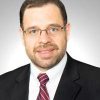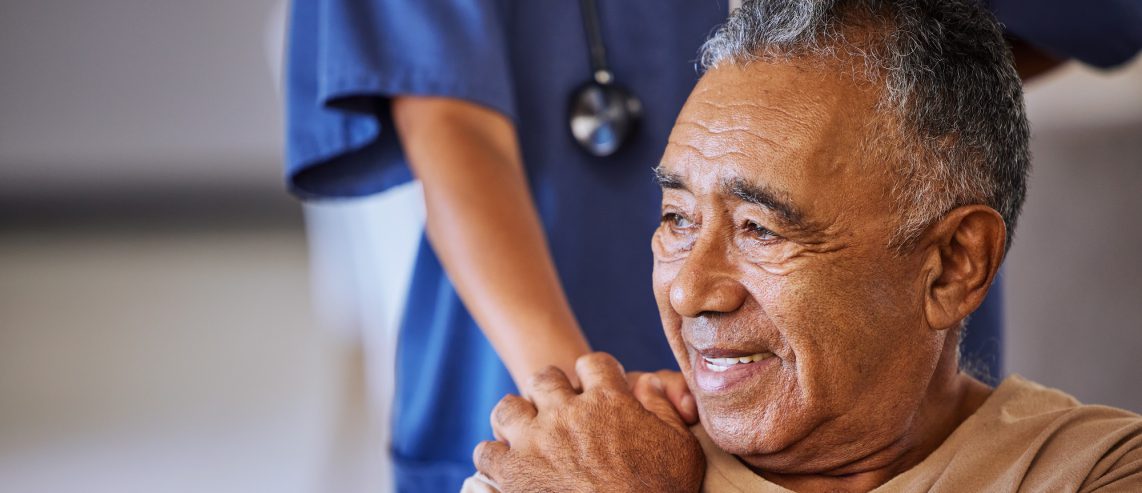Amyotrophic Lateral Sclerosis (ALS) is a disease that affects the motor neurons, which are nerve cells in the spinal cord and brain. These neurons control voluntary muscles, including those you need to speak, walk, move your arms and hands, breathe, and swallow.
In ALS, the motor neurons deteriorate and die over time. Different motor neurons control different muscles, but the disease doesn’t affect all the motor neurons at once. ALS symptoms usually start in one area — such as the hands, legs, or throat — before spreading to other areas.
The disease is very rare, affecting about six people per 100,000 in the U.S. In almost all cases, ALS is fatal, but treatments can slow the disease. UPMC, recognized by the ALS Association as a Center of Excellence, runs clinical trials with the goal of finding better treatments.
ALS Symptoms
“Early symptoms of ALS depend on which motor neurons are affected,” says Dr. Tawfiq Al-Lahham, a UPMC neurologist and director of the ALS Center.
If it starts with the motor neurons in the upper part of the spine, patients may notice arm weakness as a first symptom, Dr. Al-Lahham explains. If ALS starts in the lower part of the spine, they may have problems walking. If it starts with the motor neurons in the brain, ALS could start with speech changes or swallowing problems.
Most people first notice a single symptom of ALS, which may be easy to confuse as a sign of something else. Over time, more symptoms occur and the ALS symptoms become more noticeable.
ALS symptoms include:
- Difficulty chewing or swallowing.
- Nasal-sounding or slurred speech.
- Laughing or crying in a way you can’t control.
- Difficulty grasping or holding things.
- Muscle stiffness.
- Muscle twitches.
- Muscle weakness.
- Tripping often or dragging a foot when you walk.
- Unexplained weight loss.
In all cases, ALS continues to progress. Over time, people lose the ability to walk, speak, eat, and breathe on their own. The disease is fatal, but some people can live 5-10 years or more.
Never Miss a Beat!
Subscribe to Our HealthBeat Newsletter!
Thank you for subscribing!
You can now select the specific newsletters you'd like to receive.
You are already subscribed.
Subscribe to more newsletters in our email preference center.
Sorry, an error occurred. Please try again later.
Get Healthy Tips Sent to Your Phone!
What Causes ALS?
Doctors don’t know exactly what cause ALS. There are multiple factors that increase the risk of developing ALS, including exposure to toxins and head or neck trauma.
Many genetic mutations can play a role in ALS and there are many genes that may cause ALS. In 10% of cases, ALS is familial, or passed down from a parent to a child. In some cases, a person can carry a gene that cause ALS, and they don’t get ALS themselves.
Who Gets ALS?
Men are more likely to get ALS. Most cases of ALS start between the ages of 45 and 70. Rarely, people in their 20s or 30s can get the disease, called “early onset ALS.”
People who smoke have a higher risk of getting ALS. The disease is also more common in military veterans, but researchers don’t know why this is.
What Treatments Are Available for ALS?
At UPMC, our team creates a treatment plan targeted to each person, and we adjust our treatments as the disease progresses.
“Our patients have a wide spectrum of symptoms so we treat each person individually,” says Dr. Al-Lanham. “Our goal is to improve each person’s quality of life.”
UPMC also offers clinical trials.
Treatments and supports for ALS include:
- Medications, which can slow the progression of the disease by several months.
- Nutritional therapy, to help people with ALS maintain weight with healthy food, and diet management when swallowing or chewing difficulties develop.
- Occupational therapy to help people with ALS with appropriate exercises and durable equipment to perform daily living activities and assist functional independence.
- Physical therapy to help manage physical disabilities and mobility with appropriate exercises and assistive devices to improve safety and maximize independence.
- Psychological supports, to help people cope with feelings of fear, grief, and frustration.
- Respiratory therapy, to instruct on breathing exercises and provide equipment to help people with ALS breathe and sleep.
- Social work support to help people with ALS find financial help, access equipment, get help with meals at home, and much more.
- Swallowing specialists to evaluate for difficulties that would affect nutritional health, breathing, and to help with diet modifications to maintain safe and efficient swallowing.
- Speech therapists to help improve communication during ALS progression using assistive technology including eye gaze-controlled communication devices.
We are also working hard to speed up the diagnosis of ALS, because treatments work better if people start them earlier. The UPMC ALS team educates other providers on the signs of ALS so they can refer people to us sooner. We combine tests and specialist assessments together so we can quickly diagnose people who have ALS.
The UPMC ALS Center: A Certified Treatment Center of Excellence
The ALS Association designates UPMC’s ALS Center as a Center of Excellence. It is one of only four treatment centers in Pennsylvania with this accreditation, which recognizes both ALS patient care and research excellence.
To qualify as a Center of Excellence, clinics must include all the key health providers who treat ALS. “This means people with ALS can get all the care they need at one center,” says Dr. Al-Lahham.
Our diverse team at the UPMC ALS clinic includes:
- Doctors
- Nurses
- Nutritionists
- Occupational therapists
- Physical therapists
- Psychologists
- Respiratory therapists
- Speech and swallowing therapists
- Social workers
Clinical Trials at the UPMC ALS Center
We are one of only a few centers internationally taking part in the COMMAND trial, which studies brain-computer interface technology to improve functional independence and communication in people with severe paralysis, including people with ALS.
The UPMC ALS Center is the only Center in Western Pennsylvania that is part of the HEALEY ALS Platform Trial. ALS platform trials accelerate the path to new ALS therapies by testing multiple promising experimental drugs at the same time, decreasing the trial time and increasing patient participation. Using an efficient design with increased access for people with ALS, there is a 75% chance of receiving the study product, and a 25% chance of receiving a placebo.
Platform trials mean researchers have a higher chance of finding an effective therapy in a shorter amount of time. “By testing many possible treatments at once, there are many efficiencies, and we save a lot of time,” says Al-Lahham.
The ALS research community has already been discovering treatments at a faster rate. While the first drug approved for ALS hit the market in the early 1990s, three others became available in 2017, 2022, and 2023.
Platform trials could lead to an even faster rate of discovery. ALS is a devastating diagnosis for people and their families. The hope is to find treatment that can add years with quality to people’s lives, and one day, stop the disease completely.
Sources
ALS Association. Understanding ALS. Link
ALS Association. ALS Certified Centers and Clinics. Amyotrophic Lateral Sclerosis (ALS). Link
ALS News Today. HEALEY Trial Fully Enrolled for 2 Regimens; Data Expected by Mid-2022. Link
Centers for Disease Control and Prevention. Link
Clinicaltrials.gov. HEALEY ALS Platform Trial - Master Protocol. Link
National Institutes of Health. Amyotrophic Lateral Sclerosis (ALS). Link
Wingo et al. The Heritability of Amyotrophic Lateral Sclerosis in a Clinically Ascertained United States Research Registry. PLoS One. Link
About Neurosurgery
The UPMC Department of Neurosurgery is the largest academic neurosurgical provider in the United States. We treat conditions of the brain, skull base, spine, and nerves, including the most complex disorders. We perform more than 11,000 procedures each year, making our team one of the most experienced in the world. Whether your condition requires surgery or not, we strive to provide the most advanced, complete care possible. Our surgeons are developing new techniques and tools, including minimally invasive treatments. Find an expert near you.

